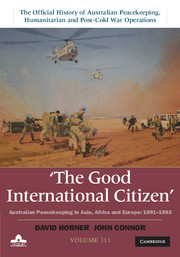Book contents
- Frontmatter
- Contents
- Maps
- Preface
- Chronology 1989–99
- Abbreviations
- Part 1 Strategy and policy
- Part 2 Cambodia
- Part 3 Western Sahara
- Part 4 Former Yugoslavia
- 14 Roads not taken
- 15 A modest commitment
- Part 5 Watch on Iraq
- Appendix A United Nations Security Council resolutions
- Appendix B Major office bearers, 1991–99
- Bibliography
- Index
- Plate section
- References
14 - Roads not taken
Australian peacekeepers in the former Yugoslavia, 1991–96
from Part 4 - Former Yugoslavia
Published online by Cambridge University Press: 12 May 2022
- Frontmatter
- Contents
- Maps
- Preface
- Chronology 1989–99
- Abbreviations
- Part 1 Strategy and policy
- Part 2 Cambodia
- Part 3 Western Sahara
- Part 4 Former Yugoslavia
- 14 Roads not taken
- 15 A modest commitment
- Part 5 Watch on Iraq
- Appendix A United Nations Security Council resolutions
- Appendix B Major office bearers, 1991–99
- Bibliography
- Index
- Plate section
- References
Summary
For a decade and a half, beginning in 1990, successive Australian governments struggled to respond to the conflict in the former Yugoslavia (see map 11). For various reasons, throughout this time Australia was extremely reluctant to contribute to the international peacekeeping forces that had been established there. The region was remote from Australia, the government thought that with the conflict on its doorstep the European Community should have borne the main burden, Australia had greater concerns closer to home and was committing forces elsewhere, often there was no actual peace to keep and, most importantly, the government did not wish to inflame ethnic tensions in Australia. Nonetheless, an analysis of why Australia declined to take part in certain missions is important in any history of Australian peacekeeping. What were the competing arguments put forward by the government's senior ministers and their departments? How much weight should Australia place on being a good international citizen? What was the effect of Australia's alliances and international responsibilities?
Although Australia resisted most requests to send forces to the former Yugoslavia, between 1992 and 2004 more than 260 Australian military personnel actually served there. About sixty of these served between 1992 and 1996, either as part of the UN Protection Force (Unprofor) or as exchange officers with American, British or Canadian units serving with various international forces. This chapter is concerned with the experiences of these personnel between 1992 and 1996, as well as why they were sent and why others were not.
- Type
- Chapter
- Information
- The Good International CitizenAustralian Peacekeeping in Asia, Africa and Europe 1991–1993, pp. 333 - 370Publisher: Cambridge University PressPrint publication year: 2014

